The Everest Base Camp Trek is a renowned adventure that takes trekkers on a 17-day journey through Nepal’s stunning Himalayan landscapes. Operated by Simrik Real Nepal Treks & Expedition P Ltd, the trek offers a chance to witness the majestic Mount Everest and take in the vibrant Sherpa culture. With breathtaking vistas, challenging hikes, and carefully planned acclimatization, the trek promises an unforgettable experience for those seeking to conquer one of the world’s most iconic destinations. But there’s more to uncover as you delve deeper into the details of this remarkable expedition.
Key Points
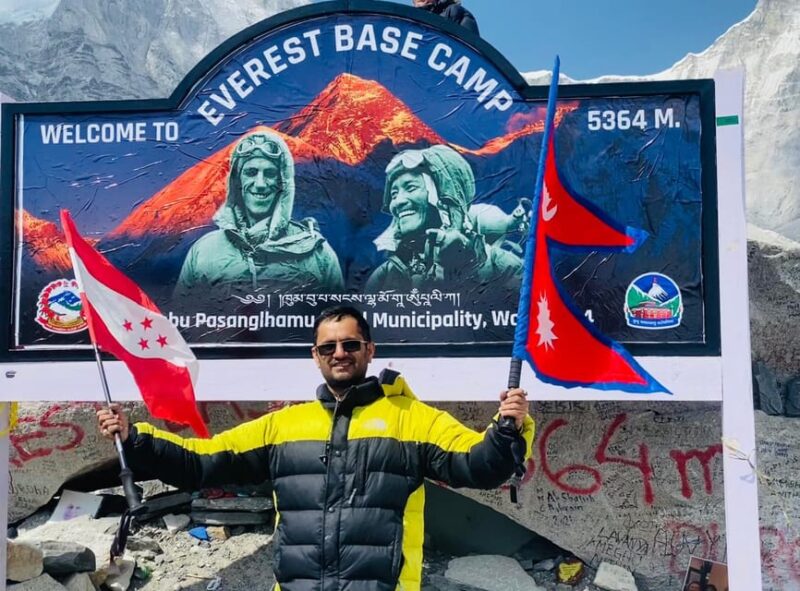
- The Everest Base Camp Trek is a 17-day trekking experience operated by Simrik Real Nepal Treks & Expedition P Ltd, established in 2010.
- The trek offers stunning views of Mount Everest and other snow-capped peaks, with an opportunity to experience Sherpa culture and traditions.
- The trek features challenging trails with an elevation gain up to 3,440m/11,283ft at Namche Bazaar, requiring good physical fitness and proper acclimatization.
- The package includes airport pickup, accommodation, meals, trekking permits, and domestic flight tickets, with a starting price of $3,605.71 per person.
- Comprehensive safety measures, such as contingency plans and first-aid kits, are in place to ensure a safe and enjoyable trekking experience.
Overview of Everest Base Camp Trek
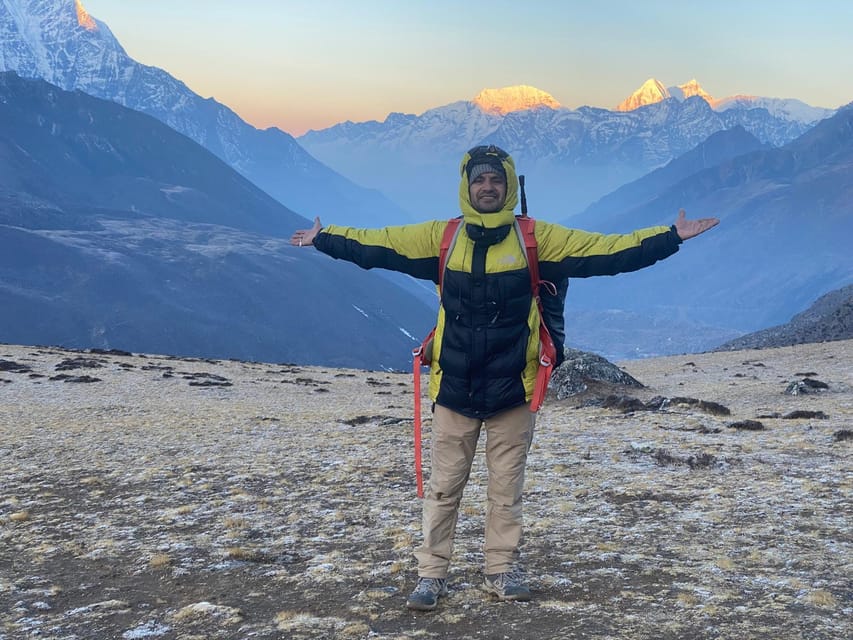
The Everest Base Camp Trek, operated by Simrik Real Nepal Treks & Expedition P Ltd, established in 2010, offers adventurous travelers a once-in-a-lifetime opportunity to witness the grandeur of the world’s highest mountain, Mount Everest, and numerous other snow-capped peaks.
This trekking experience attracts visitors globally, providing an adventure with improved amenities at base camp, including first aid and communication systems.
Trekkers can expect stunning views, challenging trails, and a chance to enjoy the unique culture and traditions of the Sherpa people along the way.
Ready to hit more trails? More hiking adventures we feature in Province No 3 Nepal
Itinerary and Duration
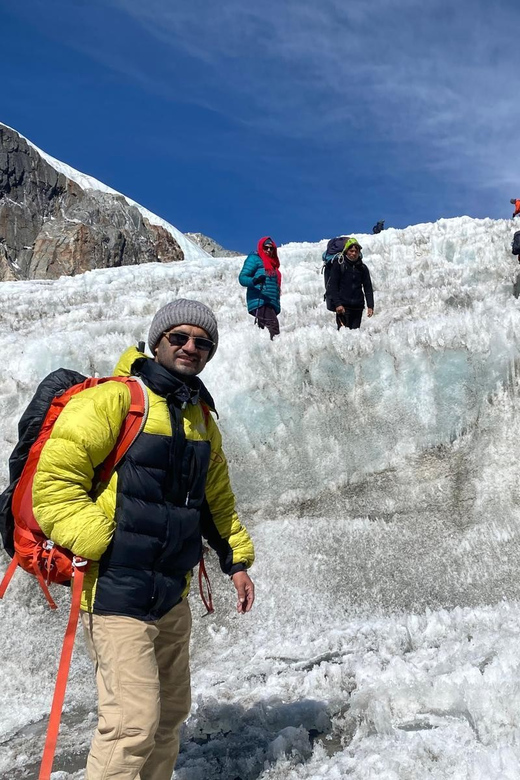
The Everest Base Camp Trek is a 17-day adventure, including acclimatization and trekking stages. The key itinerary highlights include:
| Day | Destination | Elevation |
|---|---|---|
| 3 | Lukla to Phakding | 2,652m/8,699ft |
| 4 | Phakding to Namche Bazaar | 3,440m/11,283ft |
| 5 | Acclimatization in Namche Bazaar | – |
| 6-10 | Trekking through Tengboche, Dingboche, Lobuche, and Gorakshep | – |
| 11-16 | Return trek to Kathmandu | – |
The trek offers stunning views of Mount Everest and numerous other snow peaks, attracting travelers globally and providing an adventure with improved amenities at base camp, including first aid and communication systems.
Pricing and Booking Information
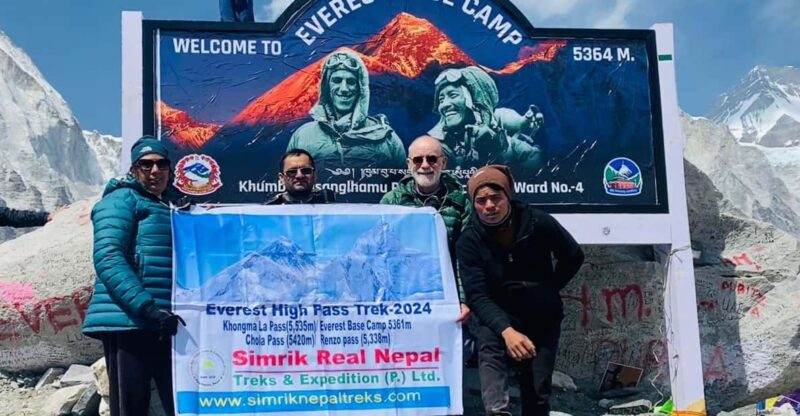
For the Everest Base Camp Trek, the price starts from $3,605.71 per person.
Travelers can reserve their spot now and pay later, with free cancellation up to 24 hours in advance for a full refund.
The package includes airport pickup, accommodation, meals, local transportation, domestic flight tickets, and permits.
Adventurers can book this once-in-a-lifetime trek with confidence, knowing that the price is inclusive of essential amenities and services.
The trekking company, Simrik Real Nepal, has been providing exceptional experiences since 2010, ensuring a safe and memorable journey to the base camp of the world’s highest mountain.
Inclusions and Exclusions
Simrik Real Nepal pulls out all the stops to ensure a carefree Everest Base Camp trek, covering a comprehensive set of essential amenities and services in the package.
The inclusions cover five-star hotel accommodation in Kathmandu, welcome and farewell dinners, meals during trekking, trekking permits, insurance for guides/porters, first-aid kits, and necessary trekking equipment like sleeping bags and down jackets.
However, the exclusions include personal expenses, international air tickets, food in Kathmandu, internet, battery charging, and expenses for extra food.
Travelers should factor in these additional costs to have a seamless and enjoyable Everest Base Camp experience.
More Great Thing To Do NearbyEssential Gear and Preparation
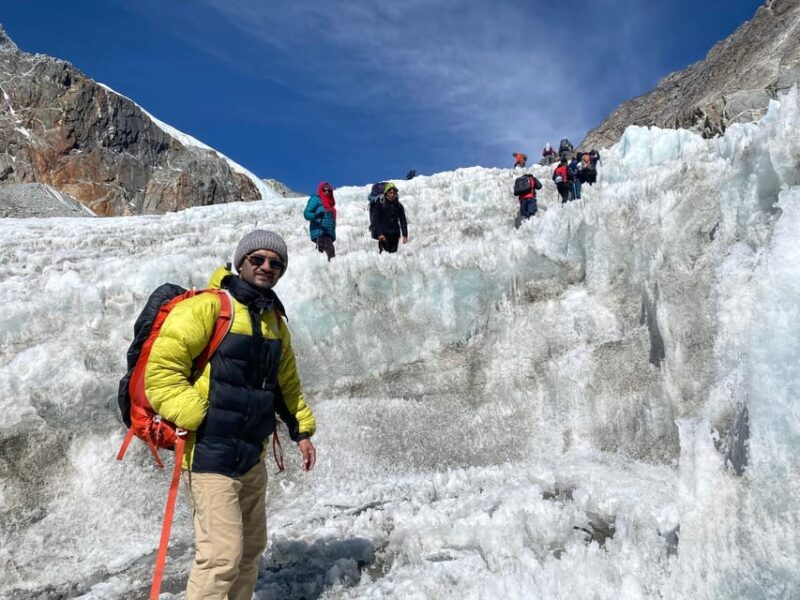
Proper trekking gear and thorough preparation are essential for a successful Everest Base Camp trek.
Recommended items include a headlamp, watch with alarm, sunglasses, quick-drying base layers, trekking shorts, thermal underwear, fleece sweaters, windproof jacket/pants, and a warm hat and gloves. Sturdy trekking boots are a must.
While sleeping bags and down jackets are provided, travelers should bring any personal items they need.
This trek isn’t suitable for children under 10 years old, as the high altitude and rigorous nature of the hike require physical fitness and stamina.
Packing the right gear and being well-prepared will ensure a safe and enjoyable Everest Base Camp adventure.
Acclimatization and Safety Considerations
Acclimatization is crucial for the Everest Base Camp trek, as the high altitudes can pose significant health risks if not properly managed. The itinerary includes dedicated acclimatization days to allow the body to adjust gradually to the decreasing oxygen levels.
Trekkers should be aware of symptoms of altitude sickness, such as headaches, nausea, and fatigue, and inform their guides immediately if they experience any. Proper hydration, limiting alcohol intake, and following the guides’ advice are essential for a safe and successful trek.
Safety is the top priority, and the trek is designed with contingency plans in case of emergencies, including first-aid kits and communication systems.
Cultural Experiences and Local Interactions
Trekking through the Everest region offers travelers a unique window into the rich cultural tapestry of the Sherpa people.
Along the way, trekkers can enjoy the local way of life, visiting traditional Tibetan Buddhist monasteries, such as Tengboche Monastery, and observing religious rituals and ceremonies.
Interactions with the friendly and welcoming Sherpa community provide insights into their customs, beliefs, and daily routines.
Trekkers may have the opportunity to visit local Sherpa homes, try traditional dishes, and learn about their unique mountaineering heritage.
These cultural experiences add depth and meaning to the Everest Base Camp journey, creating lasting memories and a deeper appreciation for the region’s vibrant heritage.
Trekking Difficulty and Physical Fitness Requirements
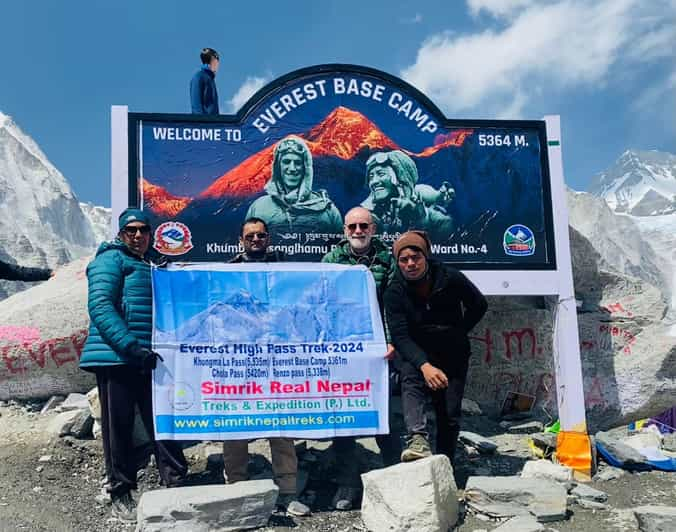
The Everest Base Camp trek is considered a moderate to challenging trekking experience that requires a good level of physical fitness.
It involves long days of hiking, steep ascents, and high altitudes that can be demanding even for experienced trekkers. Participants should be prepared to walk for 5-7 hours per day, often on uneven terrain.
Proper acclimatization is crucial to avoid altitude-related illnesses. Trekkers must also be able to carry their own day packs, which can weigh up to 10-15 pounds.
While the trek is challenging, it’s achievable for those who are in good physical shape and willing to push themselves.
Proper training and preparation are essential for a safe and enjoyable Everest Base Camp expedition.
Frequently Asked Questions
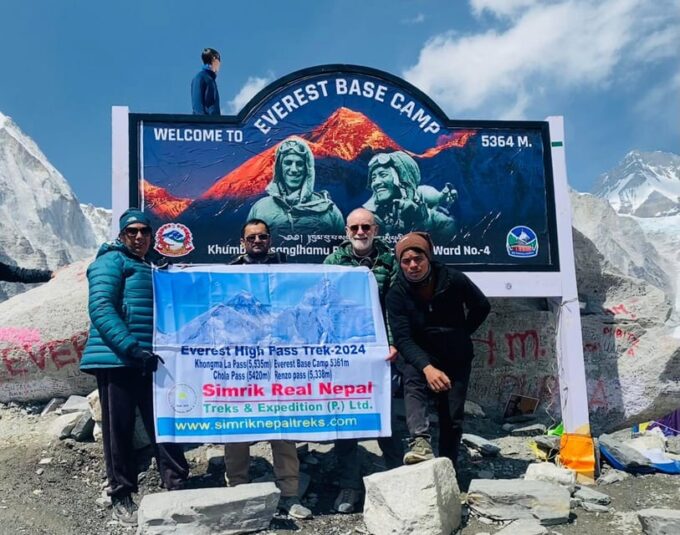
What Is the Best Time of Year to Do the Everest Base Camp Trek?
The best time to do the Everest Base Camp trek is during the spring (March-May) or autumn (September-November) seasons. These months offer clear skies, moderate temperatures, and fewer crowds for an optimal trekking experience.
Can I Bring My Own Trekking Gear or Is It Provided?
Trekkers can bring their own trekking gear, but the tour company also provides essential items like sleeping bags and down jackets. Bringing personal gear allows more customization, though travelers should consider the convenience of having gear provided.
How Difficult Is the Everest Base Camp Trek Compared to Other Treks?
The Everest Base Camp trek is considered moderately difficult, requiring a good level of physical fitness and acclimatization to high altitudes. It’s more challenging than some other popular treks but not as extreme as technical mountaineering expeditions.
What Is the Level of Medical Support Available During the Trek?
The trek provides good medical support, with first-aid kits, communication systems, and guides trained in basic emergency care. Serious medical issues can be addressed via helicopter evacuation from the higher camps.
Can I Customize the Itinerary to Fit My Preferences?
Yes, the itinerary can be customized to fit your preferences. Simrik Real Nepal offers flexible packages that allow you to adjust the duration, activities, and pace of the trek to meet your individual needs and interests.
Recap
The Everest Base Camp Trek offers an unparalleled adventure for trekkers seeking to enjoy the grandeur of the Himalayas. With meticulous planning, expert guidance, and a focus on safety and cultural enrichment, this trek promises an unforgettable experience that will leave a lasting impression on all who undertake it. Whether seeking breathtaking vistas or a deeper connection with the Sherpa way of life, this trek is a must-do for the intrepid explorer.
You can check if your dates are available here: